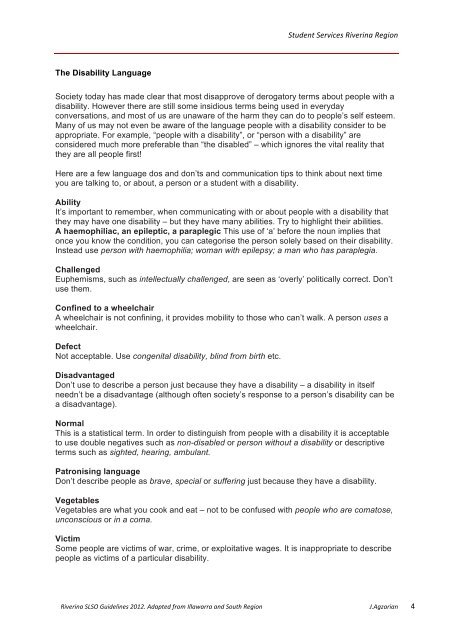A Resource for Teachers and School Learning Support Officers
A Resource for Teachers and School Learning Support Officers - Back
A Resource for Teachers and School Learning Support Officers - Back
Create successful ePaper yourself
Turn your PDF publications into a flip-book with our unique Google optimized e-Paper software.
Student Services Riverina Region <br />
The Disability Language<br />
Society today has made clear that most disapprove of derogatory terms about people with a<br />
disability. However there are still some insidious terms being used in everyday<br />
conversations, <strong>and</strong> most of us are unaware of the harm they can do to people’s self esteem.<br />
Many of us may not even be aware of the language people with a disability consider to be<br />
appropriate. For example, “people with a disability”, or “person with a disability” are<br />
considered much more preferable than “the disabled” – which ignores the vital reality that<br />
they are all people first!<br />
Here are a few language dos <strong>and</strong> don’ts <strong>and</strong> communication tips to think about next time<br />
you are talking to, or about, a person or a student with a disability.<br />
Ability<br />
It’s important to remember, when communicating with or about people with a disability that<br />
they may have one disability – but they have many abilities. Try to highlight their abilities.<br />
A haemophiliac, an epileptic, a paraplegic This use of ‘a’ be<strong>for</strong>e the noun implies that<br />
once you know the condition, you can categorise the person solely based on their disability.<br />
Instead use person with haemophilia; woman with epilepsy; a man who has paraplegia.<br />
Challenged<br />
Euphemisms, such as intellectually challenged, are seen as ‘overly’ politically correct. Don’t<br />
use them.<br />
Confined to a wheelchair<br />
A wheelchair is not confining, it provides mobility to those who can’t walk. A person uses a<br />
wheelchair.<br />
Defect<br />
Not acceptable. Use congenital disability, blind from birth etc.<br />
Disadvantaged<br />
Don’t use to describe a person just because they have a disability – a disability in itself<br />
needn’t be a disadvantage (although often society’s response to a person’s disability can be<br />
a disadvantage).<br />
Normal<br />
This is a statistical term. In order to distinguish from people with a disability it is acceptable<br />
to use double negatives such as non-disabled or person without a disability or descriptive<br />
terms such as sighted, hearing, ambulant.<br />
Patronising language<br />
Don’t describe people as brave, special or suffering just because they have a disability.<br />
Vegetables<br />
Vegetables are what you cook <strong>and</strong> eat – not to be confused with people who are comatose,<br />
unconscious or in a coma.<br />
Victim<br />
Some people are victims of war, crime, or exploitative wages. It is inappropriate to describe<br />
people as victims of a particular disability.<br />
Riverina SLSO Guidelines 2012. Adapted from Illawarra <strong>and</strong> South Region J.Agzarian 4


